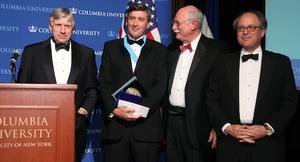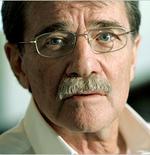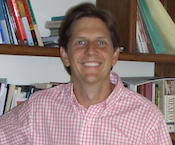Guest post by Peter Beattie:
I recently learned that tomorrow evening, October 25, there will be a big, fancy party at Columbia University in New York City to celebrate this year’s winners of the oldest international award in journalism: the prestigious Maria Moors Cabot Prizes. In the words of the preeminent Columbia Journalism School, the prizes are awarded to “journalists who have covered the Western Hemisphere and, through their reporting and editorial work, have furthered inter-American understanding.”

Clearly, furthering inter-American understanding is a very important undertaking, and I am glad to know that the Cabot Prizes are out there, giving out $5,000 honoraria to the tireless journalists who are doing their best to improve my understanding of all things inter-American. But improving awareness within the United States on domestic issues should be equally rewarded. Therefore, I decided to bestow an honorary Cabot Prize for investigative journalism that furthers intra-American understanding. But first, I needed to figure out what criteria the Cabot Prizes Board of Judges were using in making their selections. This would require a little bit of research on some of this year’s award recipients.
First up: Teodoro Petkoff, editor of the Venezuelan Tal Cual newspaper, who bravely confronts that democracy-hating dictatorship I have heard about. To learn more, I turned to the book The Dictator’s Learning Curve in which Petkoff was interviewed: “In the space of a few minutes [Petkoff referred] to Chavez as a ‘fascist,’ a ‘banana tyrant,’ and, in perhaps the strongest language, ‘a very good disciple of Hitler and Goebbels.’” Dear god! My inter-American understanding has just improved dramatically—and I'm terrified! But elsewhere in the book, Petkoff is a bit more soothing, saying about Venezuela: “This is not Cuba. This is not the Soviet Union . . . for now. This is a much more sophisticated regime than the past regimes of repression. But why can it be sophisticated? Because he has had deep and vast popular support.”

Hmm … deep and vast popular support for a fascist disciple of Hitler and Goebbels running a more sophisticated regime of repression than the Soviet Union? That’s strange, considering that a little digging reveals that Chavez has won four democratic elections widely recognized to be free and fair—perhaps having something to do with the fact that under his presidency, the poverty rate plummeted from 60% to under 30%. That’s odd for a dictator—in fact, I think it may be a contradiction in terms. Then again, the ever-prescient Petkoff anticipated my confusion and helpfully explained elsewhere that Venezuela “is a very imperfect democracy, and, at the same time, an imperfect dictatorship too.” Which kind of makes Teodoro seem, well, inconsistent. Let’s move on—perhaps the next Cabot Prize recipient will shed more light on the criteria used by the Board of Judges.
David Luhnow is the Latin America Bureau Chief for The Wall Street Journal, a paper famous for its charity work in providing stable employment for professional crazy lady Mary Anastasia O’Grady. Luhnow does not seem to be a part of the editorial board’s charity endeavor for the indisputably unhinged, but reading his co-written “The Cult of the Caudillo” article did give me more insight into the peculiar criteria that must be used to make Cabot Prize determinations.

The article defines a caudillo, or strongman, as a power-hungry, egomaniacal, authoritarian dictator who brutally suppresses and exploits his country’s people using torture, murder and violence to retain power. Well, that’s in the case of the rightwing caudillos, like Augusto Pinochet and Rafael Trujillo. In the case of leftwing caudillo Hugo Chavez, or Rafael Correa, a “caudillo in the making,” Luhnow’s definition shifts subtly, toward that of a politician with healthy-to-excessive self-esteem and a commitment to democratic procedure, whose economic policies enrage The Wall Street Journal by being too focused on helping the poor.">
Basically, the gist of the article is that there is a kind of leader called “caudillo” who can either be an undemocratic dictator using violence and terror to stay in power, or be an elected democrat using popular policies to keep getting reelected. And therefore, because democratically elected Manuel Zelaya of Honduras may one day have become a “caudillo” of one sort or the nearly-diametric-opposite other sort, it was good that the military deposed him in a coup. For the sake of democracy and stuff.

Juan Forero is the South America correspondent for The Washington Post — now here is a guy who must be a truly great journalist, as he has been tasked to cover an entire continent! In fact, he is such a fantastic journalist that focusing on merely one continent bores him — he sometimes broadens his focus to write articles like “On debt crisis, South America offers Greece valuable lessons,” in which he warns Greece not to follow the Argentinean example of defaulting on unpayable foreign debt. After all, since its default, Argentina has had to suffer through 94% growth in real GDP, and a two-thirds reduction in poverty and extreme poverty – a tragedy the Greek people would apparently want to avoid. Speaking of avoiding things, Forero’s July piece for the Post, “Latin America’s New Authoritarians,” ignored recent coups d’etat against the left-leaning elected leaders of Honduras and Paraguay. He instead focused on a far graver threat to democracy: the “new authoritarianism” of presidents who are “democratically elected,” who “do not assassinate opposition figures or declare martial law,” and govern countries with “active news media, political opposition and civil society organizations.”
El Universo newspaper receives a special citation from the Cabot Prizes for having “courageously defended their right and obligation to speak out for a democratic society” in Ecuador. That’s one way to characterize El Universo’s publication of an editorial by its editor Emilio Palacio in which he accused President Rafael Correa of ordering soldiers to fire on a “hospital full of civilians and innocent people”—a hospital that Correa also happened to be trapped inside. Such information on the “crimes against humanity” carried out by “the Dictator” Correa would be even more compelling if it actually existed outside Palacio's bizarre rant in the freedom-defending El Universo.
The Cabot Prizes criteria are slowly becoming clearer. I am fairly certain that now I understand what criteria the Board of Judges are using to make their Cabot Prizes selections. So, without further ado, I am pleased to award my honorary Cabot Prizes in Domestic Investigative Journalism to the following winners:

Dallas Commagreens, writer at Weekly World News, for his courageous reporting on Bat Boy, culminating in this three-piece exposé. Dallas’s taxonomic specificity in naming a human/bat hybrid “Bat Boy” rivals David Luhnow’s precision in defining “caudillo,” and is as sensitive to nuance as Teodoro Petkoff in defining the democratically elected Chavez as a “banana tyrant” and “disciple of Hitler and Goebbels.” The Cabot Prizes praised Forero for his “poetic human-interest stories,” an accolade that Dallas undoubtedly deserves for his poignant account of a laboratory guard and former anti-Sandinista mercenary for the Contras, Alan Thrush. Dallas, with great empathy, reported Thrush’s reaction to the squeal of bat boy: “Hell, I ain’t heard a squeal that loud since I stuck a Sandie with my bowie down in Nicky Gra-Gra.”

Frank Lake, also of Weekly World News, followed in El Universo editor Emilio Palacio’s footsteps through his scrupulous empirical work and rigorous citation method for his August 24 piece, “Kim Kardashian’s Butt Explodes.” The “tragedy struck” after Kardashian’s private plane ascended past 38,000 feet, reported Lake. (He clarified, “When implants fly above this altitude they have been known to rupture.”) Kardashian “felt a ‘bang’ in her butt,” Lake observed, “as she reached for her third deep-fried Oreo cookie.”
And my special Cabot citation should go to Marge Floori, religion correspondent for—surprise!—the Weekly World News. Her eye-opening, informative piece is titled, “HOW TO SELL YOUR SOUL TO THE DEVIL.”

Like this year’s other Cabot Prize recipients, Floori’s journalism goes beyond the mere reporting of facts. She even goes so far as to include helpful tips for the soul-seller:
By far the biggest mistake people make is to underestimate how badly Satan wants their soul. It’s like precious gold to him and he’ll pay anything to get it. When he appears, get him to make the first offer, then up it.
Remember, you’re going to burn in Hell forever. So no matter how badly off you are now, demand the best.
That’s right: if you've decided to sell your soul, don’t just settle for Maria Moors Cabot’s $5,000 honorarium.
Update (10/25): Demonstrators are organizing a peaceful protest of the Cabot Prizes this evening at Columbia University, and will meet at 6:00 p.m. at 1161 Amsterdam Avenue (outside the Italian Academy) between 116th & 117th Streets, New York, NY 10027.
Peter Beattie is a lawyer and writer based in New York City.

